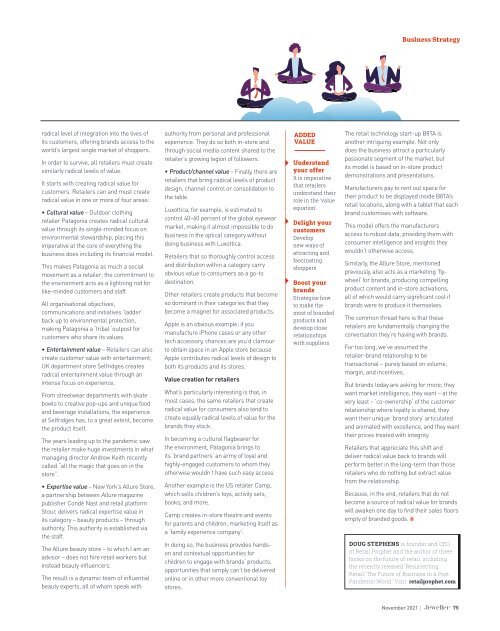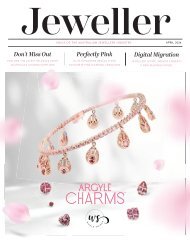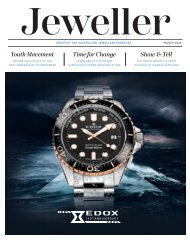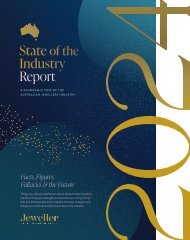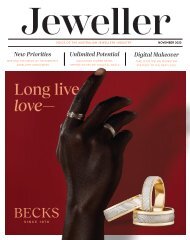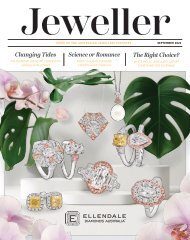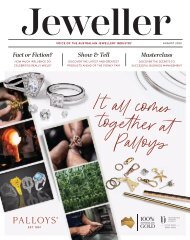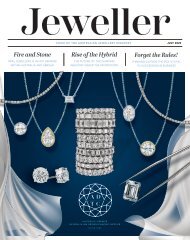Create successful ePaper yourself
Turn your PDF publications into a flip-book with our unique Google optimized e-Paper software.
Business Strategy<br />
radical level of integration into the lives of<br />
its customers, offering brands access to the<br />
world’s largest single market of shoppers.<br />
In order to survive, all retailers must create<br />
similarly radical levels of value.<br />
It starts with creating radical value for<br />
customers. Retailers can and must create<br />
radical value in one or more of four areas:<br />
• Cultural value – Outdoor clothing<br />
retailer Patagonia creates radical cultural<br />
value through its single-minded focus on<br />
environmental stewardship, placing this<br />
imperative at the core of everything the<br />
business does including its financial model.<br />
This makes Patagonia as much a social<br />
movement as a retailer; the commitment to<br />
the environment acts as a lightning rod for<br />
like-minded customers and staff.<br />
All organisational objectives,<br />
communications and initiatives ‘ladder’<br />
back up to environmental protection,<br />
making Patagonia a ‘tribal ‘outpost for<br />
customers who share its values.<br />
• Entertainment value – Retailers can also<br />
create customer value with entertainment;<br />
UK department store Selfridges creates<br />
radical entertainment value through an<br />
intense focus on experience.<br />
From streetwear departments with skate<br />
bowls to creative pop-ups and unique food<br />
and beverage installations, the experience<br />
at Selfridges has, to a great extent, become<br />
the product itself.<br />
The years leading up to the pandemic saw<br />
the retailer make huge investments in what<br />
managing director Andrew Keith recently<br />
called “all the magic that goes on in the<br />
store”.<br />
• Expertise value – New York’s Allure Store,<br />
a partnership between Allure magazine<br />
publisher Condé Nast and retail platform<br />
Stour, delivers radical expertise value in<br />
its category – beauty products – through<br />
authority. This authority is established via<br />
the staff.<br />
The Allure beauty store – to which I am an<br />
advisor – does not hire retail workers but<br />
instead beauty influencers.<br />
The result is a dynamic team of influential<br />
beauty experts, all of whom speak with<br />
authority from personal and professional<br />
experience. They do so both in-store and<br />
through social media content shared to the<br />
retailer’s growing legion of followers.<br />
• Product/channel value – Finally, there are<br />
retailers that bring radical levels of product<br />
design, channel control or consolidation to<br />
the table.<br />
Luxottica, for example, is estimated to<br />
control 40–60 percent of the global eyewear<br />
market, making it almost impossible to do<br />
business in the optical category without<br />
doing business with Luxottica.<br />
Retailers that so thoroughly control access<br />
and distribution within a category carry<br />
obvious value to consumers as a go-to<br />
destination.<br />
Other retailers create products that become<br />
so dominant in their categories that they<br />
become a magnet for associated products.<br />
Apple is an obvious example; if you<br />
manufacture iPhone cases or any other<br />
tech accessory, chances are you’d clamour<br />
to obtain space in an Apple store because<br />
Apple contributes radical levels of design to<br />
both its products and its stores.<br />
Value creation for retailers<br />
What’s particularly interesting is that, in<br />
most cases, the same retailers that create<br />
radical value for consumers also tend to<br />
create equally radical levels of value for the<br />
brands they stock.<br />
In becoming a cultural flagbearer for<br />
the environment, Patagonia brings to<br />
its ‘brand partners’ an army of loyal and<br />
highly-engaged customers to whom they<br />
otherwise wouldn’t have such easy access.<br />
Another example is the US retailer Camp,<br />
which sells children’s toys, activity sets,<br />
books, and more.<br />
Camp creates in-store theatre and events<br />
for parents and children, marketing itself as<br />
a ‘family experience company’.<br />
In doing so, the business provides handson<br />
and contextual opportunities for<br />
children to engage with brands’ products;<br />
opportunities that simply can’t be delivered<br />
online or in other more conventional toy<br />
stores.<br />
ADDED<br />
VALUE<br />
Understand<br />
your offer<br />
It is imperative<br />
that retailers<br />
understand their<br />
role in the 'value<br />
equation'<br />
Delight your<br />
customers<br />
Develop<br />
new ways of<br />
attracting and<br />
fascinating<br />
shoppers<br />
Boost your<br />
brands<br />
Strategise how<br />
to make the<br />
most of branded<br />
products and<br />
develop close<br />
relationships<br />
with suppliers<br />
The retail technology start-up B8TA is<br />
another intriguing example. Not only<br />
does the business attract a particularly<br />
passionate segment of the market, but<br />
its model is based on in-store product<br />
demonstrations and presentations.<br />
Manufacturers pay to rent out space for<br />
their product to be displayed inside B8TA’s<br />
retail locations, along with a tablet that each<br />
brand customises with software.<br />
This model offers the manufacturers<br />
access to robust data, providing them with<br />
consumer intelligence and insights they<br />
wouldn’t otherwise access.<br />
Similarly, the Allure Store, mentioned<br />
previously, also acts as a marketing ‘flywheel’<br />
for brands, producing compelling<br />
product content and in-store activations,<br />
all of which would carry significant cost if<br />
brands were to produce it themselves.<br />
The common thread here is that these<br />
retailers are fundamentally changing the<br />
conversation they’re having with brands.<br />
For too long, we’ve assumed the<br />
retailer-brand relationship to be<br />
transactional – purely based on volume,<br />
margin, and incentives.<br />
But brands today are asking for more; they<br />
want market intelligence, they want – at the<br />
very least – ‘co-ownership’ of the customer<br />
relationship where loyalty is shared, they<br />
want their unique ‘brand story’ articulated<br />
and animated with excellence, and they want<br />
their prices treated with integrity.<br />
Retailers that appreciate this shift and<br />
deliver radical value back to brands will<br />
perform better in the long-term than those<br />
retailers who do nothing but extract value<br />
from the relationship.<br />
Because, in the end, retailers that do not<br />
become a source of radical value for brands<br />
will awaken one day to find their sales floors<br />
empty of branded goods.<br />
DOUG STEPHENS is founder and CEO<br />
of Retail Prophet and the author of three<br />
books on the future of retail, including<br />
the recently released ‘Resurrecting<br />
Retail: The Future of Business in a Post-<br />
Pandemic World.’ Visit: retailprophet.com<br />
<strong>November</strong> <strong>2021</strong> | 75


